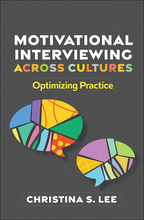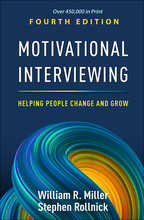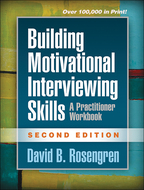Motivational Interviewing in the Treatment of Psychological Problems
Third Edition
Edited by Brian L. Burke, Brad Lundahl, and Hal Arkowitz
HardcoverPaperbacke-bookprint + e-book
Hardcover
orderJanuary 16, 2025
ISBN 9781462556229
Price: $74.00 330 Pages
Size: 6" x 9"
Paperback
orderJanuary 2, 2025
ISBN 9781462556199
Price: $49.00330 Pages
Size: 6" x 9"
e-book
orderDecember 30, 2024
PDF and Accessible ePub ?
Price: $49.00 330 Pages
ePub is Global Certified Accessible
print + e-book $98.00 $58.80
orderPaperback + e-Book (PDF and Accessible ePub) ?
Price: 330 Pages
ePub is Global Certified Accessible
Sign up for emails on upcoming titles on Motivational Approaches (with special discounts)!
“Not only is MI here to stay, but, in fact, the application of MI has great potential as a treatment modality for helping with many diverse issues....Has something for everyone interested in psychological problems. It is appropriate for new clinicians, seasoned clinicians not familiar with MI, and even—or maybe especially—for those of us who are experienced motivational interviewers and MI trainers.”

—PsycCRITIQUES (on the first edition)
“The editors and authors have offered a volume that is likely to do what they do best: motivate the field to examine important questions in the service of helping clients for change.”

—American Journal of Psychiatry (on the first edition)
“An excellent step-by-step guide to motivational interviewing rich in clinical vignettes and therapist–patient dialogues illustrating how to manage various clinical scenarios with skill and sensitivity...Therapists and researchers who are seeking a positive, respectful, and collaborative approach for helping diverse patients make positive change and for improving psychological interventions—this book is for you.”

—Psychiatric Services (on the first edition)
“Addresses important clinical conditions and problems. The clinical vignettes are extremely helpful in demonstrating how the method is applied.”

—Doody's Review Service (on the second edition)
“MI is useful for any psychotherapist treating any problem. MI strategies are deceptively simple, hugely powerful, and help clinicians provide effective treatment to some of the most challenging clients we encounter. This volume presents a straightforward, 'how-to-do-it' account of the basics of MI and describes its application to a wide variety of symptoms and disorders.”

—Jacqueline B. Persons, PhD, Director, Oakland Cognitive Behavior Therapy Center
“Bravo! This devoted group of expert MI authors shows us exactly how they use MI to help clients with high-stakes mental health problems. The third edition has chapters on crucial new areas, including culturally responsive MI, trauma-informed care, child welfare, schizophrenia, and pain management. Each author plainly describes research-proven methods for using MI with their unique clients. This book is a treasure chest of how-to nuggets for MI providers of all skill levels and within all clinical settings. Vivid case vignettes in every chapter show how MI is used as a prelude to other treatments or as a way of simply being with clients while using other treatments. MI-consistent and inconsistent elements are labeled in the transcripts, allowing us to see how MI becomes a platform for respectful, productive conversations about exceptionally difficult issues.”

—Chris Dunn, PhD, Department of Psychiatry and Behavioral Sciences, University of Washington (retired)
“This book is a wonderful addition for the library of any therapist. It will be invaluable to teachers and supervisors as they seek to provide trainees with better tools to employ evidence-supported treatments. Chapters describe key MI principles and review research supporting the use of MI in treatment of specific disorders and problematic behaviors. The clinical examples are annotated so that the elements of MI are highlighted, further enhancing their usefulness. The book is written with humor and humanity, making it a pleasure to read.”

—Donna M. Sudak, MD, Department of Psychiatry, Drexel University
“This text will be an invaluable daily resource for psychiatric mental health nurse practitioner graduate students, whose scope of practice includes biopsychosocial assessment and diagnosis, psychotherapy, medication management, and interprofessional collaboration, which are all considered in these chapters. Expanded case studies in the third edition helpfully illustrate applications of MI skills with diverse patients, providers, and problems. The inclusion of cultural implications, trauma-informed approaches, child welfare rights-focused practice, and pain management is especially timely and salient for health professionals serving the most vulnerable. The editors promise a journey and deliver—along with a craving for chocolate chip cookies. Clearly, a win!”

—Susan W. Blaakman, PhD, RN, PMHNP-BC, University of Rochester School of Nursing; member, Motivational Interviewing Network of Trainers
—PsycCRITIQUES (on the first edition)
“The editors and authors have offered a volume that is likely to do what they do best: motivate the field to examine important questions in the service of helping clients for change.”
—American Journal of Psychiatry (on the first edition)
“An excellent step-by-step guide to motivational interviewing rich in clinical vignettes and therapist–patient dialogues illustrating how to manage various clinical scenarios with skill and sensitivity...Therapists and researchers who are seeking a positive, respectful, and collaborative approach for helping diverse patients make positive change and for improving psychological interventions—this book is for you.”
—Psychiatric Services (on the first edition)
“Addresses important clinical conditions and problems. The clinical vignettes are extremely helpful in demonstrating how the method is applied.”
—Doody's Review Service (on the second edition)
“MI is useful for any psychotherapist treating any problem. MI strategies are deceptively simple, hugely powerful, and help clinicians provide effective treatment to some of the most challenging clients we encounter. This volume presents a straightforward, 'how-to-do-it' account of the basics of MI and describes its application to a wide variety of symptoms and disorders.”
—Jacqueline B. Persons, PhD, Director, Oakland Cognitive Behavior Therapy Center
“Bravo! This devoted group of expert MI authors shows us exactly how they use MI to help clients with high-stakes mental health problems. The third edition has chapters on crucial new areas, including culturally responsive MI, trauma-informed care, child welfare, schizophrenia, and pain management. Each author plainly describes research-proven methods for using MI with their unique clients. This book is a treasure chest of how-to nuggets for MI providers of all skill levels and within all clinical settings. Vivid case vignettes in every chapter show how MI is used as a prelude to other treatments or as a way of simply being with clients while using other treatments. MI-consistent and inconsistent elements are labeled in the transcripts, allowing us to see how MI becomes a platform for respectful, productive conversations about exceptionally difficult issues.”
—Chris Dunn, PhD, Department of Psychiatry and Behavioral Sciences, University of Washington (retired)
“This book is a wonderful addition for the library of any therapist. It will be invaluable to teachers and supervisors as they seek to provide trainees with better tools to employ evidence-supported treatments. Chapters describe key MI principles and review research supporting the use of MI in treatment of specific disorders and problematic behaviors. The clinical examples are annotated so that the elements of MI are highlighted, further enhancing their usefulness. The book is written with humor and humanity, making it a pleasure to read.”
—Donna M. Sudak, MD, Department of Psychiatry, Drexel University
“This text will be an invaluable daily resource for psychiatric mental health nurse practitioner graduate students, whose scope of practice includes biopsychosocial assessment and diagnosis, psychotherapy, medication management, and interprofessional collaboration, which are all considered in these chapters. Expanded case studies in the third edition helpfully illustrate applications of MI skills with diverse patients, providers, and problems. The inclusion of cultural implications, trauma-informed approaches, child welfare rights-focused practice, and pain management is especially timely and salient for health professionals serving the most vulnerable. The editors promise a journey and deliver—along with a craving for chocolate chip cookies. Clearly, a win!”
—Susan W. Blaakman, PhD, RN, PMHNP-BC, University of Rochester School of Nursing; member, Motivational Interviewing Network of Trainers













